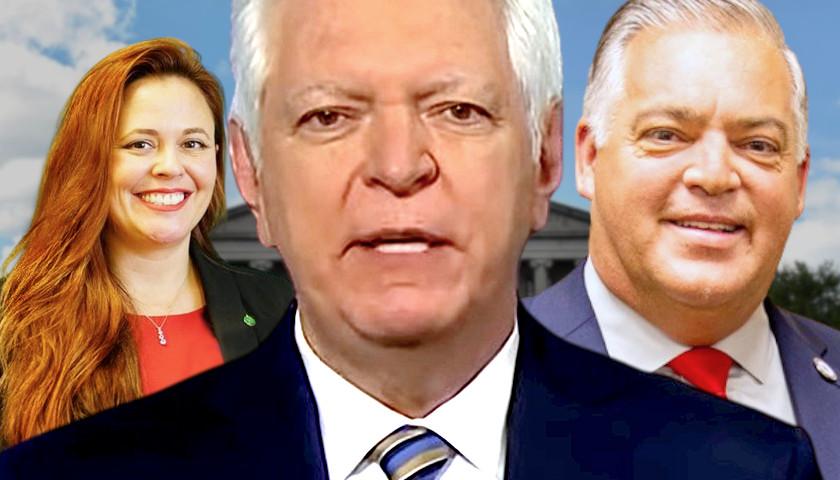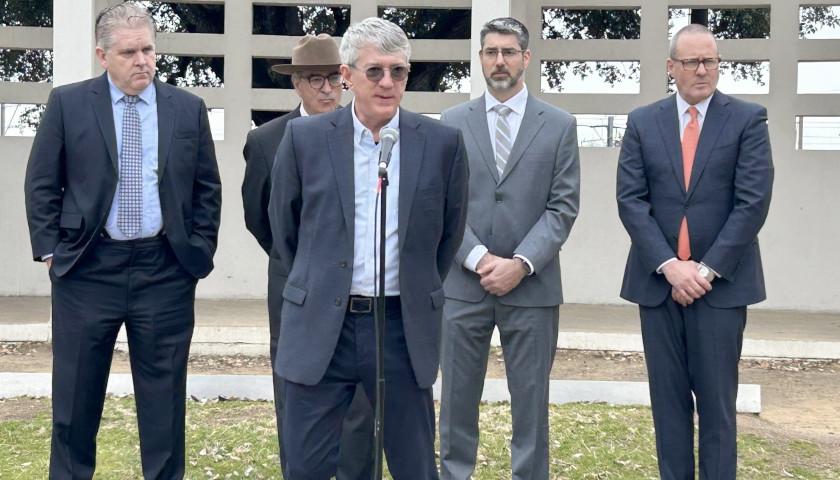Live from Music Row Thursday morning on The Tennessee Star Report with Michael Patrick Leahy – broadcast on Nashville’s Talk Radio 98.3 and 1510 WLAC weekdays from 5:00 a.m. to 8:00 a.m. – host Leahy welcomed all-star panelist Clint Brewer in studio to discuss the proposed reduction of Metro Council members from 40 to 20 and how a support staff would make it more efficient.
Leahy: We are talking with all-star panelist, all-around good guy, recovering journalist Clint Brewer about one of the most interesting bills introduced into the Tennessee General Assembly this week.
When it convened, by the way, one little thing to note is that all bills must be introduced by January 31st in the House and by February 15th in the Senate. They’ve moved that up. I think that’s a good thing, right? You don’t have any last-minute bills thrown in, although you could throw a so-called caption bill in.
A caption bill is on a general topic, and then you put the details of it in later. But I think this is a good thing. The bill was introduced by House Majority Leader William Lambert and Senator Bo Watson. It says that no more than 20 voting members will be on the Metro Council. It’s three metro governments, and Nashville is one of them. They’re two others.
Brewer: Memphis and Shelby.
Leahy: No, two small cities.
Brewer: I’m sorry. Not Memphis. Trousdale. Hartford is one of them.
Leahy: Trousdale. Which is kind of bizarre because it’s kind of a small county. It is, but nonetheless. Well, I forget the other one. Bob Mendes, the council member at large, had this comment on it. Note that the proposed state law does not cut the council size to 20.
The law would require Metro to pick a council size of not more than 20. So here’s what he said. There’s nothing automatic about picking a council size. The first attempt at consolidated government in 1958 proposed 21 in council. It failed. It’s kind of interesting, right?
Brewer: Yes, it is. Here’s the thing. This may seem like it’s punitive to the Metro government and to Davidson County for rejecting the Republican National Convention. There are scenarios where this could actually be helpful.
I know a lot of council members probably don’t want to hear that. They don’t want to have their seats taken away. They don’t want the legislature messing with local government. I get that.
Leahy: Asterisk. Every local government is established by the state.
Brewer: Yes, they have to be chartered by the state of Tennessee. But here’s the thing. Let’s just say for argument’s sake, and Bob Mendes is a very thoughtful member of the council and a good attorney.
And so let’s say we take it just for argument’s sake from 40 down to 20 or 15. Right now you’ve got five at large members and the rest are district members.
Leahy: Thirty-five. They’ve broken the county down into 35 districts.
Brewer: Right. You’ve got that structure. Essentially what you’d be doing is everybody would be at large. You can call them a district, but you’re going to have fewer people with far more constituents.
Leahy: There are a couple of constituents, I guess, how they do it. And I think under this legislation, it would just say how you organize these would be something that the Metro Council would figure out
Brewer: Up to you. It’s just the head count.
Leahy: The head count would be not more than 20. So right now they’ve got five at large and 35 districts. I think they could say, well, yeah, they could make 20 at large or 15 at large or 10 at large, or they could drive at large.
Brewer: Or five at large.
Leahy: And five at large and 15 districts, whatever.
Brewer: What you might do here, here’s the real rub, is that the number is almost arbitrary. The question becomes if you cut it in half or even less than that, are you going to give these folks any help? Are you going to give them any staff? Are you going to give them any support? Is it going to become much more like a legislative job in a bigger city?
Leahy: Right now, my understanding is at least the district members of the council, maybe at-large too, have no staff support.
Brewer: None of them do.
Leahy: They come in, and they do their own research.
Brewer: Yes, there’s a council staff, quote, unquote. But I mean, it’s a handful of people, certainly not enough to serve 40 folks. And I can tell you I have friends who are district council members, and colleagues who are district council members, it is an overwhelming job.
The number of people who contact you, the number of questions you get, the number of complaints you get. I mean, it’s everything from potholes and break-ins to road projects to developers with rezoning. It’s just endless.
And they don’t have a lot of bandwidth because they’re normal people and that’s not their full-time job. It’s a part-time job. You’re being a true public servant and it’s a lot. Imagine a metro council with 20 people, and these are some of the points Bob Mendes has made publicly.
A metro council with 20 people, with some staff support, might actually become a more attractive job. It might attract some more serious players, and some more serious people with more professional experience because it would be a meteor engagement.
If you had staff, you had more constituents, and frankly, you had more influence because you are one of fewer number with votes. It might be a more attractive job. You might attract a different kind of person to run for council.
Leahy: Mayor John Cooper has weighed in. Would you like to hear what he had to say?
Brewer: Sure.
Leahy: Here’s what he said. I’ll read the full statement and then we can analyze it.
Brewer: All right.
Leahy: “As recently as 2015, Nashville residents voted by a nearly two-thirds margin to keep the Metro Council at 40 members. Far from strengthening local democracy, today’s legislation undermines the will of Nashville voters and effective local governance. (By the way, I’m just doing a little emphasis here.)
Brewer: And this vote was when.
Leahy: “Contrary to claims by our state colleagues, this Metro council has successfully facilitated historic accomplishments for our city, including record investments in education, (excuse me while I laugh uproariously about the effectiveness of education in Metro Nashville) enhanced support for our first responders and major economic development agreements that will directly benefit the state’s economy (i.e. let’s give the Titans another $750 million).
Brewer: The Nashville Metro government is widely perceived to be set up as what’s called a strong mayor system. The mayor has most of the authority and the power in the Metro government, and having 40 members decentralizes those members’ authority. I guess what I’m trying to say is I’m not sure that the General Assembly is actually going to hurt Nashville.
Leahy: If they pass this.
Brewer: It might actually be a better system.
Leahy: I would tell you I think it would be a better system.
Brewer: Only if they get the support, the staff support, only if there is an infrastructure built and established to support these members. If you cut the council size by half or less and you do not give them the support they need with staff and other things, then it would be a disaster.
Leahy: (Laughs) It’s already a disaster. C’mon. It’s a total disaster right now.
Brewer: Look, any legislative body in a large American city is going to be messy. It just is and it always has been. You can go back 150 years and look at them. They are always messy.
Listen to today’s show highlights, including this interview:
– – –
Tune in weekdays from 5:00 – 8:00 a.m. to The Tennessee Star Report with Michael Patrick Leahy on Talk Radio 98.3 FM WLAC 1510. Listen online at iHeart Radio.
Photo “Metro City Council” by nashville.gov.




